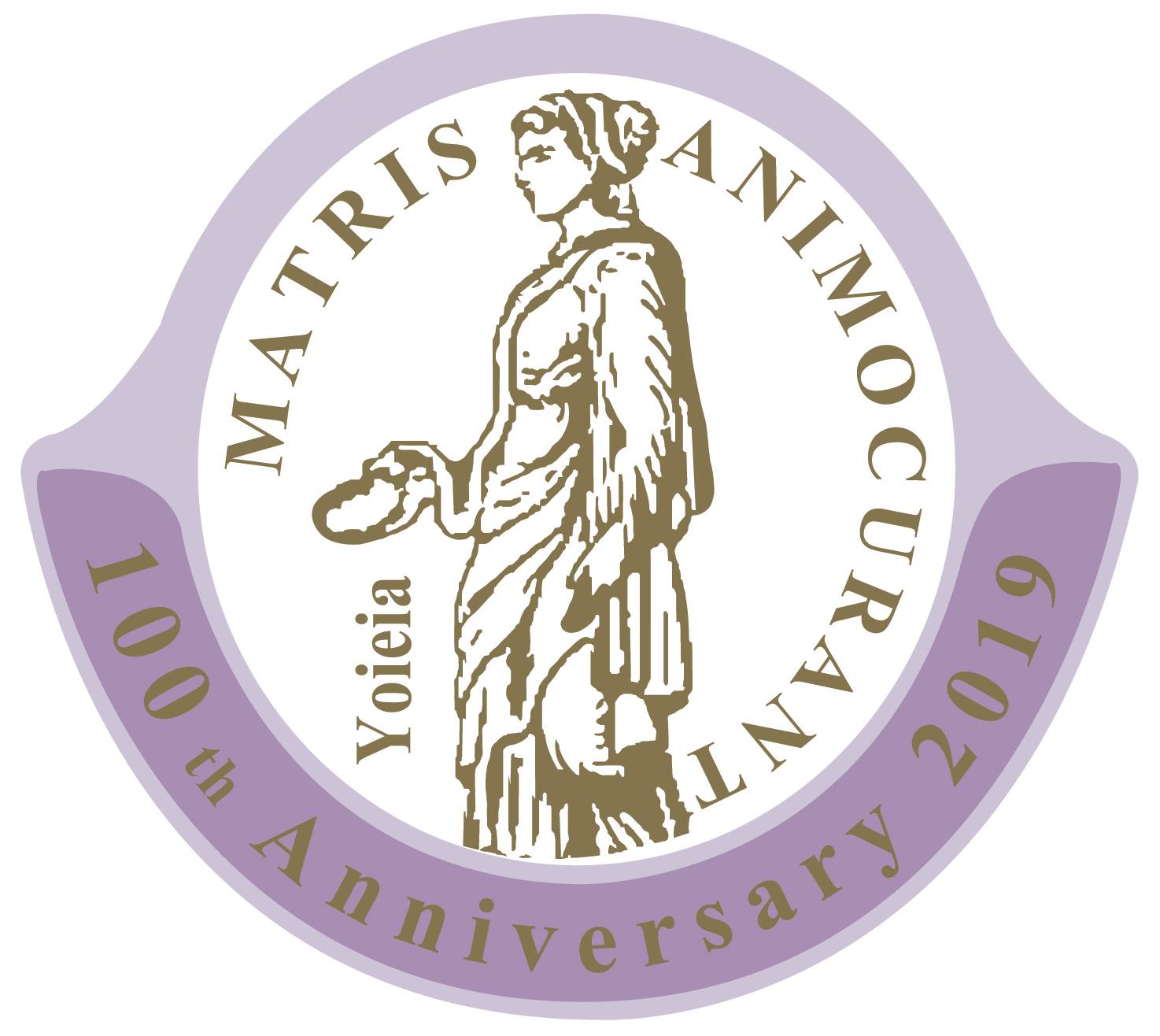Below is a brief summary of important activities of MWAP during the quarter of April to June 2024;
Workshop: Building a Respectful and Harassment–Free Work place
The Medical Women’s Association of Pakistan (MWAP), in collaboration with the Faculty of Psychiatry at KEMU, organized a one-day interactive workshop on April 2, 2024 with the theme “Building a Respectful and Harassment-Free Workplace”. The activity was primarily led by Prof. Nazish Imran, Director of Research at MWAP, under the patronage of VC KEMU, Prof. Mahmood Ayyaz. The objective of this workshop was to sensitize the audience to the different types of harassment and their implications, and to brainstorm ideas for creating a safe workspace. The workshop was attended by doctors, clinical psychologists, and students who actively participated in hands-on training activities such as case scenarios and critical discussions on the implementation of laws related to harassment. Facilitators included Prof. Dr. Nazish Imran, Prof. Ali Madeeh Hashmi, and Dr. Irum Aamer. Dr. A. Aysha Zaheer, Director of the Harassment and Counseling Cell at MWAP, was invited as a special guest. The take-home messages of the seminar emphasized the importance of regular awareness sessions, sensitizing everyone about the need for and their own role in creating safe working environments, and taking proactive approaches in this regard.
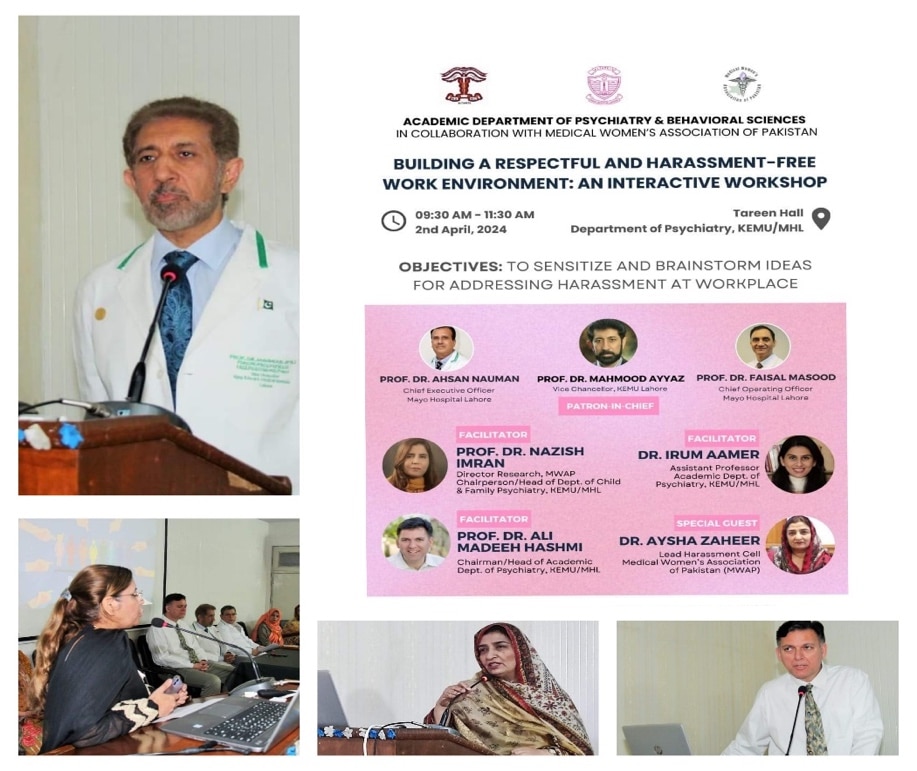
Orientation Seminar on the legal, social, and institutional perspective of workplace harassment in Pakistan
Dr. Wajiha Rizwan, President of MWAP, along with Prof. Bilquis Shabbir, SVP of MWAP, Ms. Rukhsana Gilani, the 3rd Ombudsperson, Dr. Shabnum Sarfraz, Global Director for Gender and Health at GWH, Pakistan, Prof. Nasreen Ehsan, Dr. Shaper Mirza, Prof. Shameyal Hanif, and Dr. Ayesha Nauman were invited to the aforementioned seminar held at Sheikh Zaid Hospital. This highly informative seminar was organized by the SKZMDC team, including Prof. Mona (Dean), Prof. Ayesha Hamayun (Principal), and Dr. Lubna Riaz (Assistant Director, CPD, MWAP)
The seminar provided valuable insights into the legal, social, and institutional aspects of harassment in the workplace. Workplace harassment, in its various forms, poses a serious threat to the well-being and productivity of employees, with women being particularly vulnerable. Dr. Wajiha Rizwan, President of MWAP, shared cases of workplace harassment that have been brought to MWAP’s attention and praised the efforts of the Ombudsman in providing justice to the victims. She added that any such incidents can be reported to MWAP at counsellingcellmwap@gmail.com (Director of the Counselling Cell, Dr. Aysha Zaheer).
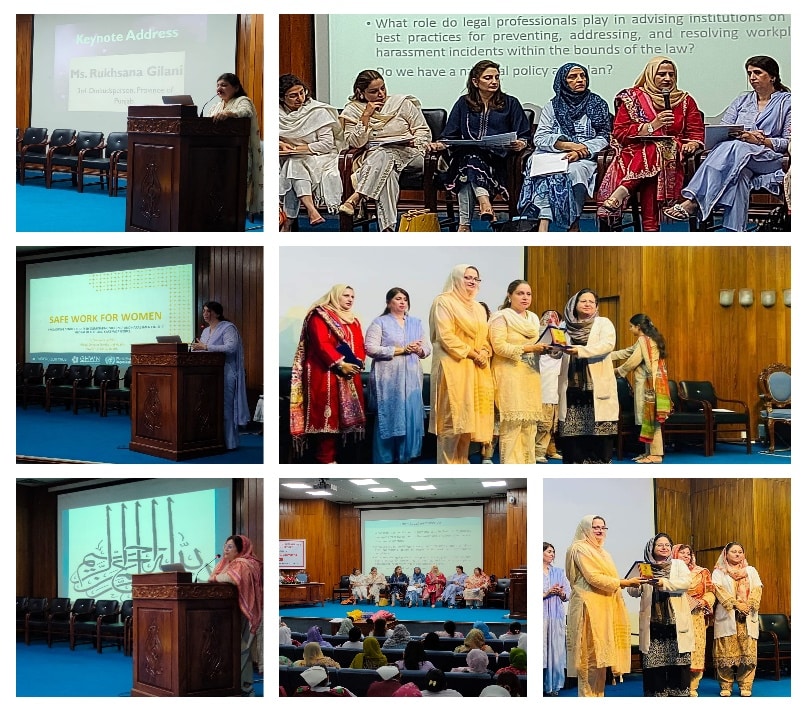
Seminar at GEMCON (Gujranwala Medical College’s International Conference:
“Empowering Healthcare: Unveiling Successes in Community Engagement and Indigenous Research and the Way Forward”:
In line with MWAP’s goal of helping women health professionals excel in academics, research, and community building, the above-mentioned seminar was organized at GEMCON on May 4, 2024. Esteemed speakers included Col (R) Dr. Khalid Raheem, Director of DME at UHS, Dr. Naeem Zafar, President of PAHCHAAN and PPA Punjab, and Prof. Nazish Imran. The session was chaired by Prof. Mulazim Bukhari and co-chaired by MWAP President, Dr. Wajiha Rizwan. Dr. Khadija Munir, SG of MWAP, moderated the session along with Dr. Syeda Rizwana.
MWAP acknowledges the support of Prof. Iqbal Dogar, Principal of GMC, and Prof. Irfan, Director of DME at GMC, in making this event a success.
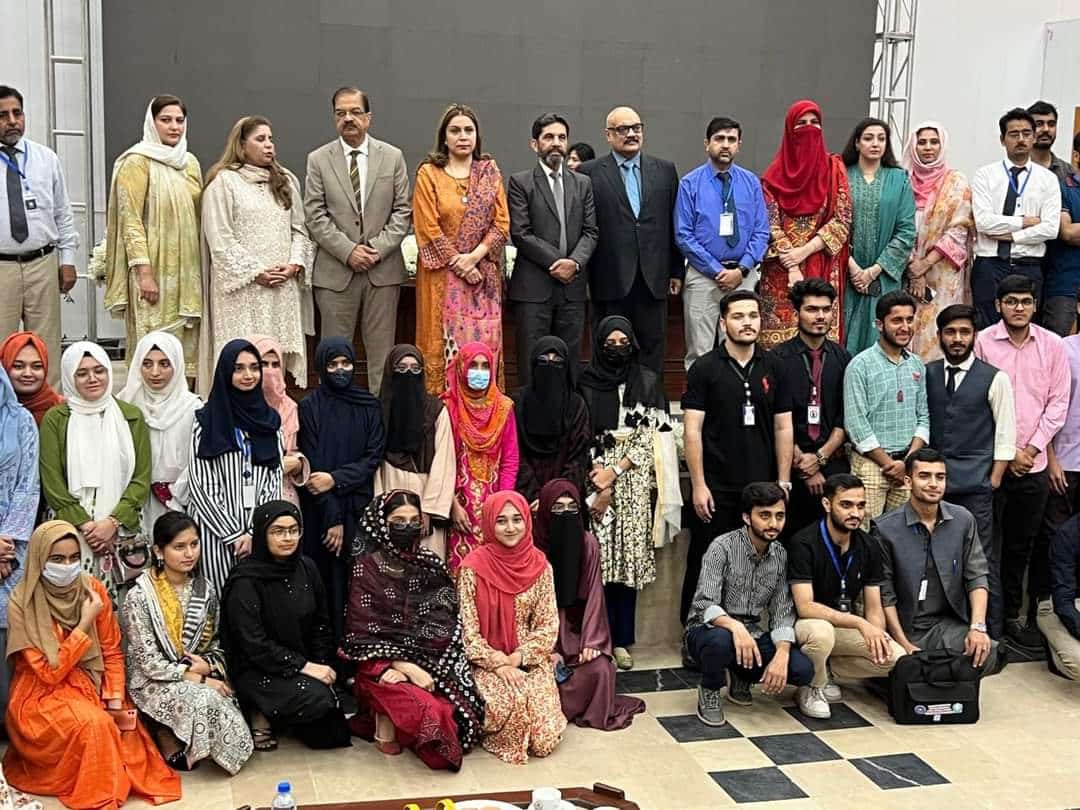
Seminar: Autism awareness; from acceptance to inclusion.
To address the challenges in the management of autism and empower the mothers of children with autism, a seminar was organized by the Director of Punjab MWAP, Prof. Aisha Sajid, at the University Medical and Dental College. The theme was “Autism Awareness: From Acceptance to Inclusion.” The event was well-attended by doctors, nurses, psychologists, and mothers of autistic children.
The seminar focused on engaging mothers in policy dialogue regarding the management of autism, empowering them to actively participate in decision-making processes. By involving these mothers, the seminar highlighted the crucial role women play in advocating for and improving autism care, thus promoting their empowerment and strengthening their voices in the healthcare community.
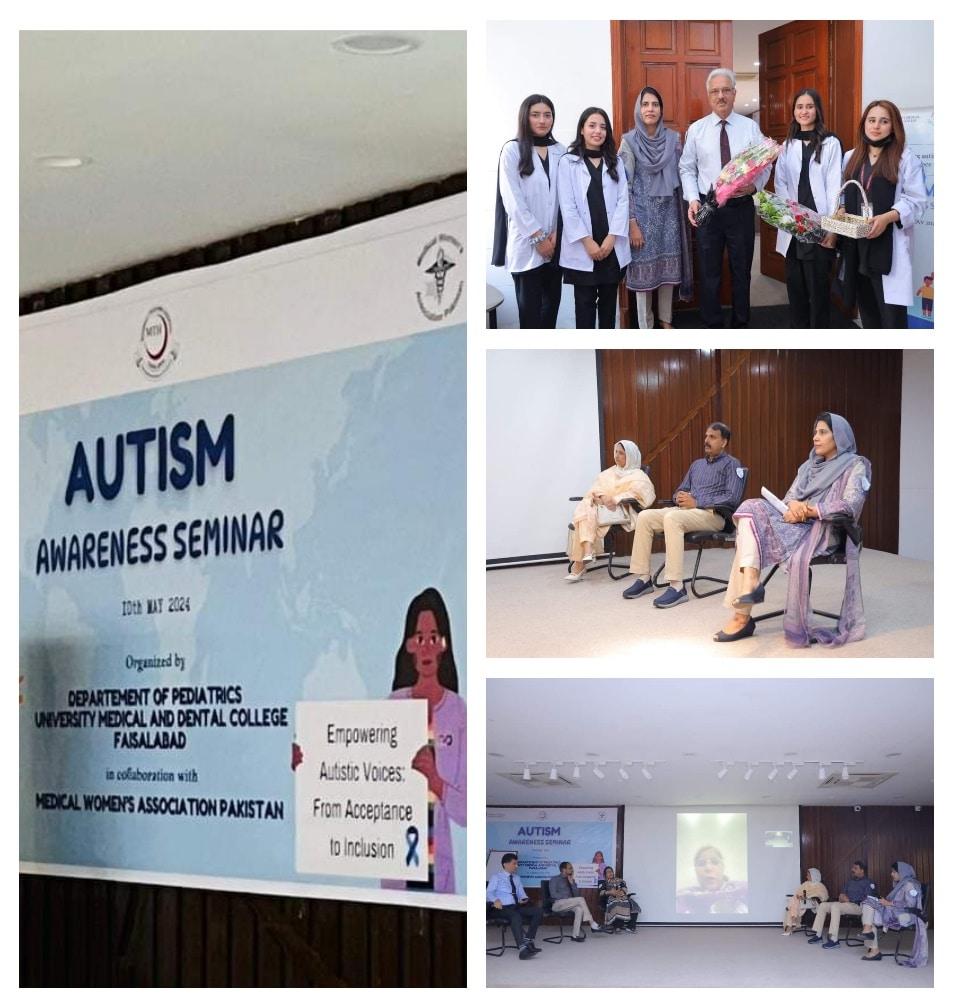
World Menstrual Hygiene Day Commemorated at JSMU
To mark World Menstrual Hygiene Day on May 21, 2024, MWAP organized a seminar at Jinnah Sindh Medical University (JSMU) and leveraged social media to address menstruation-related issues comprehensively. The event, spearheaded by Prof. Haleema Yasmin, Director Sindh MWAP, in collaboration with the Gynecology Department at JSMU, the Pediatric Endocrinology Department at NICH, and the JSMU Student Council, covered topics such as early puberty, menstrual hygiene management, and dysmenorrhea.
The seminar highlighted cultural norms and attitudes towards menstruation in Pakistan, emphasizing education and empowerment. Discussions on the rising trend of early puberty among girls and the physical and emotional implications were central. Prof. Haleema Yasmin stressed the importance of open communication and support systems for young individuals. Prof. Mohsina Ibrahim addressed dysmenorrhea, underscoring its significance and often-overlooked impact. The event, coordinated by Afeefa Siddiqui, President of the Student Council, aimed to foster a more informed and empowered community.
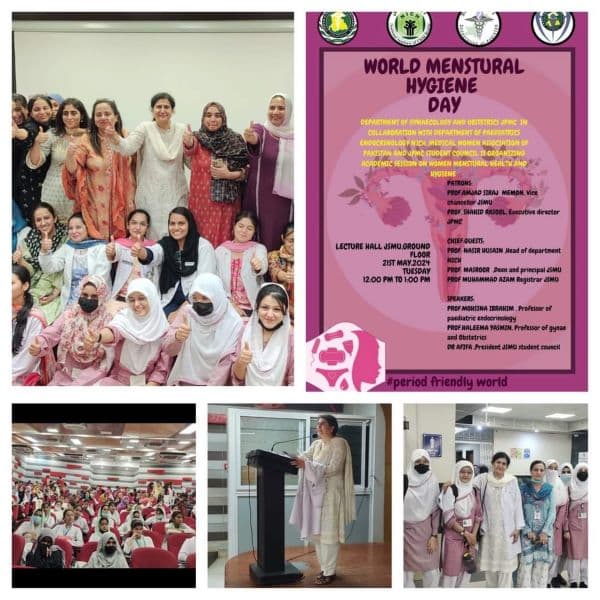
Webinars:
A webinar organized by Prof. Salma Kundi, Director KPK MWAP, and immediate past president of the Pakistan Medical Association (PMA), moderated by Prof. Mulazim Bukhari, focused on the Obstacles faced by women health professionals in Pakistan, particularly in research. Dr. Wajiha Rizwan, President of MWAP, highlighted the importance of indigenous research and MWAP’s efforts under leadership of Director Research, Prof. Nazish Imran to foster national and international research collaborations. Prof. Saima Chaudry, Chairperson of the MWAP Advisory Board, discussed the male-dominated nature of clinical research, gender bias in research funding, and the lack of female networks and recognition of Women leaders. Prof. Saba Sohail, Principal of Dow Medical College, Prof. Zohra Khanum, Principal of SIMS and Prof. Mahwish Arooj, Principal of UCMD, were appreciated as strong female leaders and role models for young female physicians.
Another MWAP webinar, “Unraveling the WPBA Portal for Supervisors and Trainees,” led by Prof. Bilquis Shabbir, SVP MWAP, addressed queries related to the mandatory Workplace Based Assessment (WPBA) in postgraduate institutes in Pakistan
